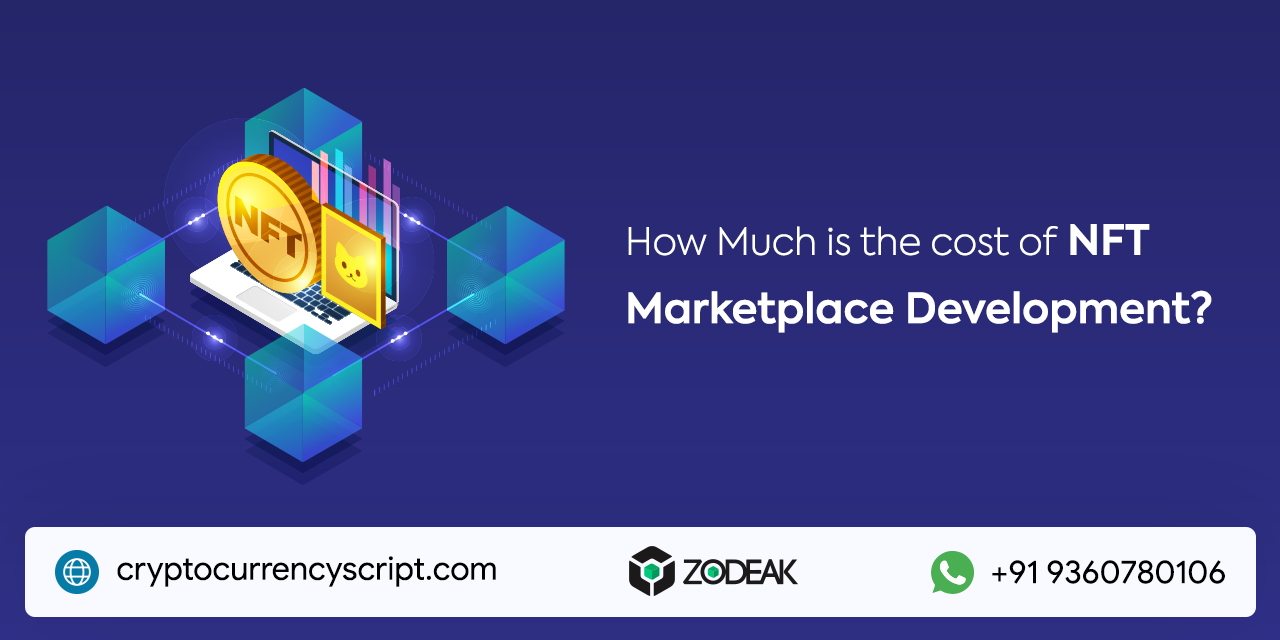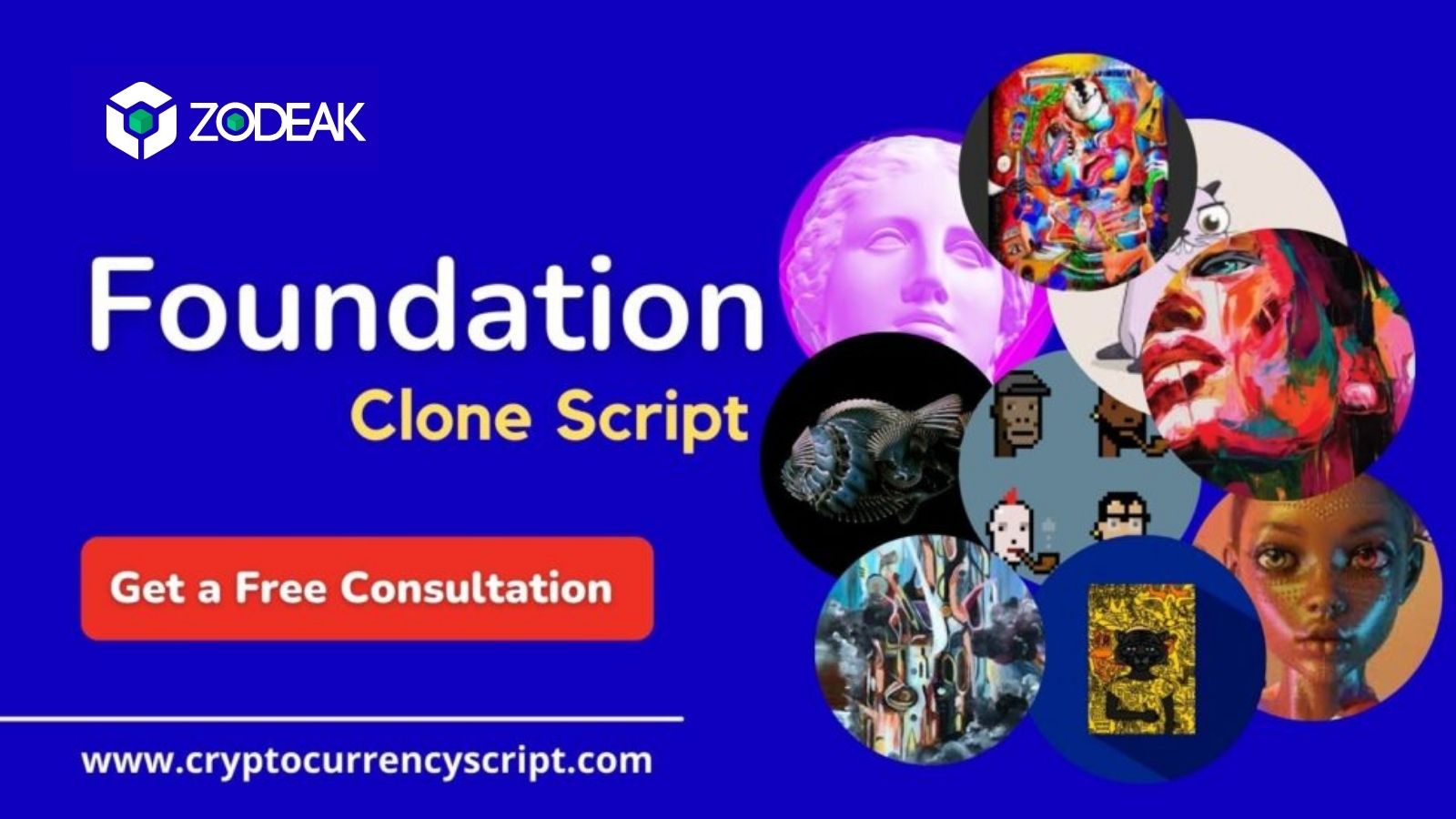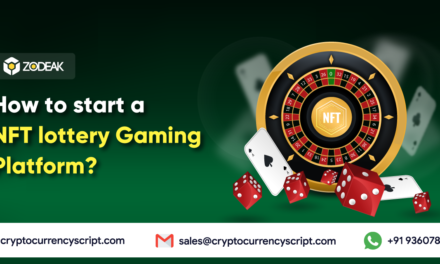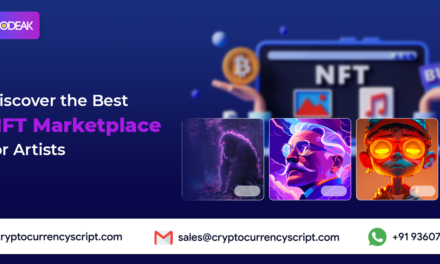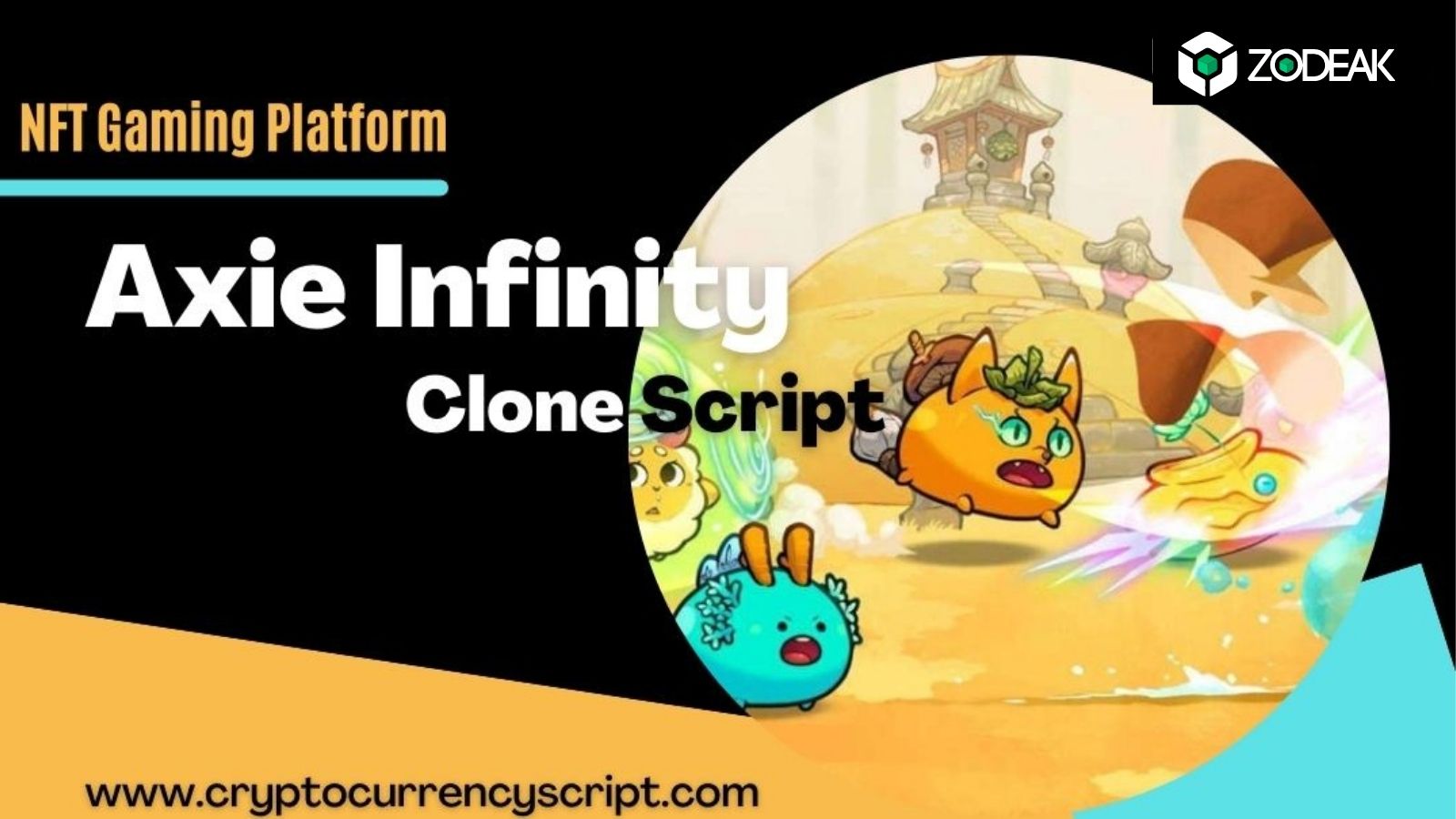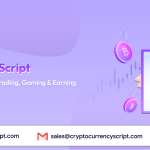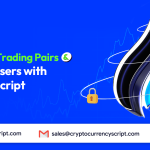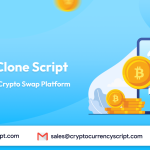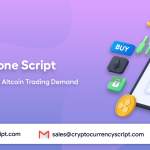NFT marketplaces like SuperRare, OpenSea, and Rarible have grabbed attention for funding and high revenue. According to the statistic report, the NFT market revenue is expected to depict an annual growth of 27.26% from 2022 to 2027 and is expected to project an amount of about 8,412 million dollars by 2027.
This is a positive sign where the business using NFT means using gold. This is the most probable reason why enterprises and startups are wished to move towards selling/buying NFTs or investing in the NFT marketplace development.
Before stepping to invest in your own NFT marketplace development, it’s much better to know about the approximate cost required to develop the marketplace. Suppose you are hunting to know about the cost to develop the NFT marketplace, then don’t worry you are at the right place.
This article clears you up about the cost to develop an NFT marketplace, factors that influence the cost of your NFT marketplace development, and some more criteria to consider before developing an NFT marketplace.
If you are looking for basic knowledge on NFT, head on to our article – internal link
So, without delay, let’s proceed….
NFT Marketplace Development Cost – An Overview
The cost to develop an NFT marketplace ranges from $10k to $50k and the cost may also vary based on the customization requested by you. Are you interested to develop your own NFT marketplace from scratch? it is possible but the cost to create the NFT marketplace is costlier compared to the NFT marketplace script.
The functionality of the platform follows some patterns. You have to increase your budget for NFT marketplace development when your requirement leads to a complicated platform.
Moreover, tools and technologies used in the platform also determine the cost of the NFT marketplace. Apart from these factors, aspects like NFT marketplace features, team size, hours spent, tech stack, and more also influence the NFT development cost.
So, let’s discuss each feature in detail to know about the cost to create an NFT marketplace
Features that Impact the cost of the NFT Marketplace Development
If you look to create an NFT marketplace, then the feature is one of the prime factors which most probably determines the cost of an NFT marketplace. You have to be conscious to choose the best NFT marketplace development company in a way to provide a hassle-free back-end process in case of complicated transactions.
Below are some of the must to have features when you go for customized NFT marketplace development:
1.Storefront
This provides the users with information like details of NFT, owner, creator, price history, bid, and more. Storefront act as a dashboard that improves customer engagement.
2. Enhanced Search Functionality
While developing your NFT marketplace, assure that your platform features support category tagging and management functionality. This makes it simple for the users to search for collectibles that they are willing to buy.
3. Create Listing
This feature is mostly used by the seller. The platform should be designed in a way to provide users the feasibility to create listings where the users could add their NFT details.
4. Auction and buy
An efficient NFT marketplace platform must include an auction & buy feature. You should give users an option to add the bid amount, expiration date, and watchlist to show the details of the bid status.
5. Wallet integration
Generally, users in the platform use a wallet to send, receive and store NFTs and cryptos. Either you can create your own wallet ot you can integrate an existing popular wallet with your platform to make your users comfortable with their transactions.
6. Instant notification
Your NFT marketplace platform must have a push notification tool that forwards all the latest information through email. Pushes notifications related to real-time data like newly launched NFT, debut on collectibles, future auctions, and so on. A strategized push notification will help you with a high platform conversion rate.
7. Ratings
In the NFT business model, the rating is one of the best features for both buyers and sellers. Users are fond of performing business with those who have a strong reputation. The rating system reduces negative behaviors like reverting transactions, and false representation before the smart contract.
These are some of the must to have features of an NFT marketplace. There are still some other features like multi-payment gateway integration, metaverse integration, and more.
One of the best parts of the NFT marketplace is that you can blend the platforms for NFTs, NFT trading, and NFT crypto all in a single environment. These are the major part that influences the cost of the NFT marketplace development. Apart from these, there are also some other factors influencing the cost of NFT platform development.
Other Factors That Influence The Cost of Your NFT Marketplace Development
It consumes a lot of effort and time to create an NFT marketplace right from scratch. Suppose you have an idea about blockchain-based development then it’s quite simple, you can integrate additional functions required for NFT platform development.
Here platform complexity and integration of functions also add to your cost. Moreover, here is a comprehensive list of factors that are linked directly with NFT marketplace development cost.
1. NFT tech stock:
The tech stack needed to build an NFT marketplace plays a key role in cost assessment. The commonly used tech stack are NFT standards, blockchain network, storage platform, front-end, and back-end. Here let’s see a detailed analysis of the technologies used.
The creation of the NFT platform includes NFT market app development features, supporting back-end services, and third-party integration.
2. NFT marketplace category niche:
The cost of NFT platform development depends on the NFT categories you have selected as your niche.
Top 4 Categories of NFT marketplace
1. Open and premium marketplace- This is the most common NFT marketplace. But the platform has less number of features compared to the closed platform One best example of an open & premium NFT marketplace is OpenSea.
2. Curated and non-curated marketplace– Curated marketplace act as a user-friendly environment for authorized artists who look to sell their work. On the other hand, a non-curated marketplace stimulates both authorized and non-authorized artists, making it simpler for users to sell. An example of a non-curated marketplace is Spotify.
3. Collectibles marketplace- This is the exact platform for collectors where users can sell and buy various types of digital NFTs. For example, especially for sports fans NBA sports highlights are available as NFTs.
4. Games marketplace– The gaming sector gains popularity with NFTs. Especially online gaming. Here the users can sell, buy, and invest on numerous gaming platforms to achieve enhanced features, avatars, or levels.
Let’s see the cost analysis for NFT marketplace development based on the above said 4 categories.
1.NFT development team and process
You have to outsource your NFT projects to blockchain-based NFT experts who can sketch out a successful design, development, and testing plan. Your NFT marketplace development team needs below roles:
1.Project Managers
2.NFT developers
3.UI/UX designers
4.Solution Architect
5.Business analysts
6.Quality assurance officers etc.
The average cost of NFT developers may vary based on the region you belong to. In the USA the cost for the developers is approximately range from $100 to $200 on an hourly basis. Whereas in India the NFT development cost is comparatively low since they pay the developer around $50 on an hourly basis. Similarly, the NFT development cost in the region such as Europe, and Australia pay developers approximately $80 per hour. Now talking about the process, depending on the design, development, and testing done by your development team, the average cost is estimated
2. NFT marketplace maintenance cost
If you are looking to build NFT solutions in long run, then you have to spend a separate amount for the maintenance and support of your NFT marketplace platform. Your maintenance and associated cost might induce the following factors such as platform update, server cost, third-party integration, security patches, and bug fixes.
Now we come to the end of the costing aspect of NFT marketplace development. Next, the most common question that revolves around the NFT marketplace is the revenue stream. So here are some monetization strategies you can follow to make money using a marketplace development app.
Monetization Models
It is necessary to consider various NFT business models and monetization practices to earn and maximize revenue. Here, I share with you the top 4 monetization strategies
1.Royalty
NFT marketplace charges a percentage of the amount on every NFT. The royalty model is broadly used among all NFT marketplace platforms as it works efficiently.
2. Listing
The process of tokenization also charges a certain amount from the NFT creators. For example, your platform charge creator small fees to list their NFTs on your platform.
3. Promotions
Here, you can make a special banner on your NFT platform for the purpose of marketing and you can earn from the respective brands. This is one of the fast ways to monetize based on advertising.
4. Bidding
The auction done on your NFT platform is also one process of monetization. As a platform owner, you can earn by charging platform fees for every auction taking place on your platform.
Now, I think you might gain knowledge about the development process. Just we are one step away, you have to know about some standards used to build NFT marketplace.
Standards to Know Before Creating an NFT Marketplace
As there is soo much hype created for NFT in the market, it is definitely profitable for businesses to create an NFT marketplace to link buyers and sellers.
Understanding about few more characteristics of NFTs will be much useful for you to choose your niche and development approach. Below are some of the most needed steps you have to know before you join the NFT world.
1.Non-fungible token standards
Standard is the driving element of an NFT. It says how assets are handled and interacted with basic functionalities.
Presently, there are two standards which are generally used for creating an NFT
ERC 721: This standard maps a unique identifier to an address that denotes the owner of the identifier. It provides a permission way of transferring assets using the ‘TransferFrom’ method.
ERC 1155: Using this standard, the IDs can denote a class of assets. compared to ERC 721, ERC 1155 is the most efficient. For example, if you are a game developer and you want to sell 200 armor sets, then you have to write 200 smart contracts with ERC 721, but with ERC 1155, you can write one smart contract, this state the best.
2. Non-fungible token metadata
In the NFT space, there is a concept named ownerOf. This provides a way to see the owner of an NFT. For example, if you search for ownerOf(290491) on ABC NFT’s smart contract, it shows the owner of the token is XYZ – you can verify this data on a marketplace like OpenSea.
But how OpenSea-like platform will understand item 290491? this is the place where metadata comes into existence. Metadata provides descriptive information for specific token IDs in form of pictures, descriptions, or additional traits.
Besides the terminologies, there is one thing that entrepreneurs struggle to know about the legal documentation required to create the best NFT crypto platform. The legal document must include the following:
These points would assist you throughout your project documentation, categorization, and execution. Now, all you need is well-versed NFT marketplace development services to assist you with exact cost estimation, featurization, and development support.
Company formation
Terms of service
Community standards
Privacy policy
IP consideration details.
Create An NFT Marketplace With Leading Technology Partner
Now, I think you may what are all the features and other factors which influence the cost of an NFT marketplace platform. Besides creating your own NFT marketplace from scratch, and shaking hands with a leading NFT marketplace development company you can easily create NFTs and NFT platforms to meet your business goals to earn high revenue. The development company will act as a backbone to your business project, where you can make your dreams come true in the crypto market.

